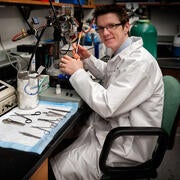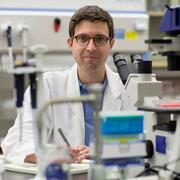Innovative Collaborative Research Applied to Problems of Brain Health and Disease
2025 CGNI Symposium Speakers
Sue Griffin, PhD
Alexa and William T. Dillard Professor in Geriatric Research
Director of research at the Donald W. Reynolds Institute on Aging
University of Arkansas for Medical Sciences
Founding Chief Editor of the Journal of Neuroinflammation
"When… two worlds collide: Neuroinflammation (IL-1b) and The Alzheimer Gene (APOEe 4)"
Dr. Sue Griffin received both a bachelor's and master's degree in nutrition from the University of Tennessee in Knoxville. In 1974, she earned a Ph.D. in physiology from the University of Rochester, School of Medicine. Following the completion of her doctorate, Dr. Griffin was a fellow at the University of Texas Southwestern Medical Center in Medicine. In 1986, Sue moved to her home state of Arkansas to take a position in the Department of Pediatrics at the University of Arkansas for Medical Sciences, where her laboratory was physically located at Arkansas Children's Hospital. Although ostensibly committed to the pathogenesis of neurological aberrations in Down Syndrome, her laboratory pursued the connections of this condition to Alzheimer's disease.
In 1989, Dr. Griffin published a paper demonstrating the elevation of an immune system modulator, interleukin 1, in both Down Syndrome and Alzheimer's disease. This represents one of the first published connections between Alzheimer's disease and neuroinflammation. Dr. Sue Griffin went on to show how this inflammation contributes to formation of amyloid plaques, neurofibrillary tangles, and Lewy bodies in Alzheimer and Parkinson disease brains, as well as its connections to genetic differences that confer greater risk of Alzheimer's disease in certain individuals.
In 2016, Dr. Griffin was awarded the lifetime achievement award from the Alzheimer's Association at its international conference. In 2018, she was inducted into the Arkansas Women's Hall of Fame.
VISIT DR. SUE GRIFFIN'S FACULTY PROFILE
Astrid E. Cardona, PhD
Professor and Department Chair
Molecular Microbiology and Immunology
University of Texas at San Antonio
"Fractalkine-Mediated Neuroprotection in the Diabetic Retina"
Dr. Astrid Cardona is Professor and Chair of the Department of Molecular Microbiology and Immunology at The University of Texas at San Antonio. Dr. Cardona is a scientist educator with a B.S. in Biology from the University of Antioquia, Medellin, Colombia. In 2002, she received her Ph.D. in Microbiology and Immunology from The UT Health Science Center, San Antonio, and continued her post-postdoctoral training in autoimmunity and neurodegeneration at the Cleveland Clinic. She joined UTSA in 2009 and established a research program in neuroinflammation.
Dr. Cardona’s laboratory studies the interplay between the nervous and immune systems in diabetes and multiple sclerosis. She is interested in clarifying the protective and detrimental roles of the innate immune system, determining the origin of tissue injury factors that account for disease progression, and testing neuroprotective therapies via modulation of immune cell function. Her research has been supported by the NIH, the National Multiple Sclerosis Society, the San Antonio Area Foundation, and the San Antonio Medical Foundation. Dr. Cardona acts as the contactact rpgorm director for the UTSA T32/NIAID training program in Molecular Microbiology and Immunology. She is a fellow of the IAspire Leadership Academy. She has served as editor for Frontiers in Cellular Neuroscience, The International Journal of Neurochemistry, and currently for the Journal of Neuroinflammation.
VISIT DR. ASTRID CARDONA'S LAB
Tammy Kielian, PhD
Professor and Choudari Kommineni Endowed Professor of Pathology
University of Nebraska Medical Center
"Neuroinflammation and Staphylococcus aureus craniotomy infection- an epic battle"
Tammy Kielian received a BS in Biological Sciences from the University of Nebraska-Lincoln in 1991, a MS in Immunology from Kansas State University in 1994, a PhD in Immunology from the University of Kansas Medical Center in 1998 and completed postdoctoral training in neuroimmunology at Dartmouth Medical School. In 2001, she established her independent laboratory at the University of Arkansas for Medical Sciences and was recruited to the University of Nebraska Medical Center in 2008 where she is a professor and holds the Choudari Kommineni Endowed Professorship in Pathology.
Dr. Kielian’s research interests span the fields of immunology, infectious diseases, and neuroscience with a unifying theme of innate immunity. Her laboratory has a long-standing interest in studying the pathogenesis and immune responses elicited by S. aureus biofilm using mouse models of prosthetic joint and craniotomy infection. Her laboratory also collaborates with orthopaedic surgeons and neurosurgeons at UNMC to explore immune responses in patients with prosthetic joint and craniotomy infections with the goal of identifying novel immune biomarkers for infection diagnosis and therapy.
Dr. Kielian has served as a regular and ad-hoc member on numerous NIH study section panels and her research program has been continuously funded by the NIH since its inception in 2001 with a total of 155 research publications to date. She recently became editor-in-chief of Journal of Neuroinflammation in 2024. Dr. Kielian received the Graduate Student Association Distinguished Mentor Award in 2015, the Outstanding Mentor of Junior Research Faculty Award in the Department of Pathology and Microbiology in 2019, the Outstanding Mentor of Graduate Students Award from the UNMC Faculty Senate in 2022, and was named the UNMC Scientist Laureate in 2016, the highest honor that UNMC bestows to researchers.
visit Dr. Tammy Kielian's Faculty Profile
David J. Loane, PhD
Associate Professor, Neuroscience
School of Biochemistry and Immunology
Trinity College Dublin
The University of Dublin
"NOXious inflammation in the aged and injured brain"
Dr. David Loane's lab research mission is to identify neuroimmune mechanisms that drive post-traumatic neurodegeneration and loss of neurological function, with a goal to developing novel neuroprotective strategies that promote long-term functional recovery after brain injury.
Their lab studies the neuroimmunology of traumatic brain injury (TBI) and related neurodegenerative diseases. A major focus is to investigate the activation status and functional role of brain resident microglia and infiltrating immune cells following acute brain injury, and to determine how they contribute to chronic neurodegeneration and cognitive decline after brain trauma. Dr. Loane's pre-clinical TBI research group seeks to elucidate the molecular mechanisms that regulate microglial/macrophage function with the goal of manipulating these cells to attenuate destructive pro-inflammatory responses, and promote neuroprotective pro-repair responses.
Ongoing studies include examining:
1. The function and phenotypes of microglia/macrophages following acute TBI, and how they contribute to chronic pathologies;
2. The signaling pathways that promote anti-inflammatory immune cell activation, and whether these pathways can be manipulated after TBI;
3. How old age affects post-traumatic neuroinflammatory responses;
4. The effects of TBI on systemic immune function.
John Lukens, PhD
Director, Harrison Family Translational Research Center in Alzheimer’s and Neurodegenerative Diseases
Harrison Distinguished Teaching Professor of Neuroscience
Center for Brain Immunology and Glia
University of Virginia
“Role of Innate Immune Dysfunction in Neurodegenerative Disease”
Dr. John Lukens received his PhD from the University of Virginia in 2008 for his work describing roles for PD-1 and functional T cell exhaustion in persistent liver infection. For his postdoctoral training, Dr. Lukens worked in the laboratory of Dr. Thirumala-Devi Kanneganti at St. Jude Children’s Research Hospital where he identified molecular pathways involved in innate cytokine production. In Fall 2014, John returned to UVA to launch his lab in the Department of Neuroscience and the Center for Brain Immunology and Glia (BIG). His group is focused on understanding how innate immune signaling contributes to neurodegenerative, demyelinating, and neurodevelopmental disorders. They are particularly interested in defining the roles that inflammasomes, immune-based DNA damage sensors, ITAM/ITIM receptor signaling, and the meningeal lymphatics play in the pathogenesis of Alzheimer’s disease, multiple sclerosis, traumatic brain injury, and autism.
Lee A. Shapiro, PhD
Associate Professor
Department of Neuroscience and Experimental Therapeutics
Texas A&M University School of Medicine
Associate Editor, Journal of Neuroinflammation
"Targeting Invariant Chain (CD74) in Glia and Immune Cells to Improve Post-Traumatic Syndromes"
Dr. Lee Shapiro received his PhD in neuroscience from the State University of New York, Stony Brook, under the mentorship of Dr. Patricia Whitker-Azmitia. His dissertation involved looking at serotonergic, neuroimmune and neuropathological influences in Down Syndrome and Alzheimer's disease, specifically focusing on the role of S100 beta.
After receiving his PhD, Dr. Shapiro went to the University of California, Irvine, to do post-doctoral research under the guidance of Dr. Charles Ribak. Dr. Shapiro honed his neuroanatomical and microscopy skills under the guidance of Dr. Ribak, while describing neuronal and glial changes in models of epilepsy. During his post-doctoral studies, Lee also pioneered several unique aspects of adult neurogenesis in the hippocampus, and in other cortical regions. After completing his Fellowship, Dr. Shapiro came to Texas A&M University and established his own lab as described below, and is further pursuing studies involving epilepsy, trauma and other neurodegenerative disorders.
Dandan Sun, MD, PhD
UPMC Endowed Chair Professor of Brain Disorders Research
Professor of Neurology
Department of Neurology, School of Medicine
University of Pittsburgh
“Dynamic regulation of microglial metabolism and function in the CNS injury and repair”
Dr. DanDan Sun’s research interests focus on studying the roles of ion transporter proteins, such as Na-K-Cl cotransporters, Na/Ca exchangers, and Na/H exchangers, in ionic dysregulation and neurodegeneration in experimental models of ischemic stroke, traumatic brain injury, and glioblastoma. The ion transporter proteins are pathologically stimulated under these disease conditions. The dysregulated ion transport function further interrupts the cellular and metabolic equilibrium. Dr. Sun’s lab is investigating the underlying mechanisms and modulating ion transport protein function as novel therapeutic strategy for these brain disorders.






